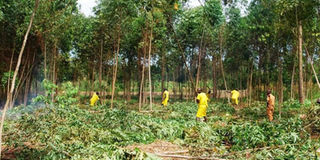Kyotera sets tough rules on eucalyptus tree planting

Site. Inmates destroy eucalyptus tree plantations in Kaku wetlands in Kitooro Village, Lwengo District last year. Youth in neighboring Rakai District also want wetland encroachers in the area evicted. PHOTO BY WILSON KUTAMBA
What you need to know:
- In 2017, President Museveni directed all people who planted eucalyptus trees in wetlands to cut them down while those owning fish ponds in the middle of swamps were ordered to harvest their fish and leave.
Authorities in Kyotera District have set strict guidelines for planting eucalyptus trees in the district.
The intervention comes weeks after youth in the neighbouring Rakai District under their body umbrella, Young Generation Forum, vowed to take on people planting eucalyptus trees in wetlands and on the shores of Lake Kijjanebarora, saying authorities had failed to execute their mandate.
Under the guidelines, eucalyptus tree planters have to seek clearance from the district natural resource office through their village and sub-county leaders.
“The district council is going to set up committees at a village level that will send lists of applicants to the sub-county before they are handed over to the district natural resource officer for clearance,” Mr Patrick Kintu Kisekulo, the Kyotera District chairperson, said during an interview in Monday.
Mr Kisekulo said a team from the district natural resource department will later visit the sites where eucalyptus trees will be planted.
“During those visits, the team will ensure that the proposed site [for planting eucalyptus trees] is away from homesteads and water sources,” he said.
The district chairperson said a big number of eucalyptus tree plantations in the district are planted in wetlands which has caused them to dry up. The most affected wetlands include Naludugavu, Kyojja and River Bukoola.
“Those people are planting eucalyptus trees under the pretext of restoring the depleted forest cover, but they are instead draining our water sources and destroying the environment,” he said.
He added that many residents have been planting eucalyptus trees without being cautious of their impact on the environment.
“Wetlands, lakes and river banks are eco-sensitive and unfriendly to fast-growing eucalyptus trees. We are optimistic that the guidelines will bar people from planting eucalyptus trees in the few existing wetlands and swamps in the district,” he said.
Mr Patrick Bakumpe, the chairperson of production, marketing and natural resource committee at Kyotera District, said almost every village has a problem of people who plant eucalyptus tree any where.
He said: “Most of the arable land in the district which could have been used to plant food crops are currently occupied by eucalyptus plantations which threaten food security in the area,” he said.
He said they would distribute the right tree seedlings to residents to plant and mark the boundaries of their farms.
However, the move has attracted a negative reaction from some eucalyptus tree planters in the district, who say it is intended to drive them out of business.
Mr Paul Kaggwa, a eucalyptus tree planter at Bukunda Trading Centre in Kyotera, said some of them own land near swamps, adding that barring them from utilising this land will be unfair.
“We are not planting eucalyptus within demarcated wetlands, but on peripheral zones where we own land which is titled,” he said.



